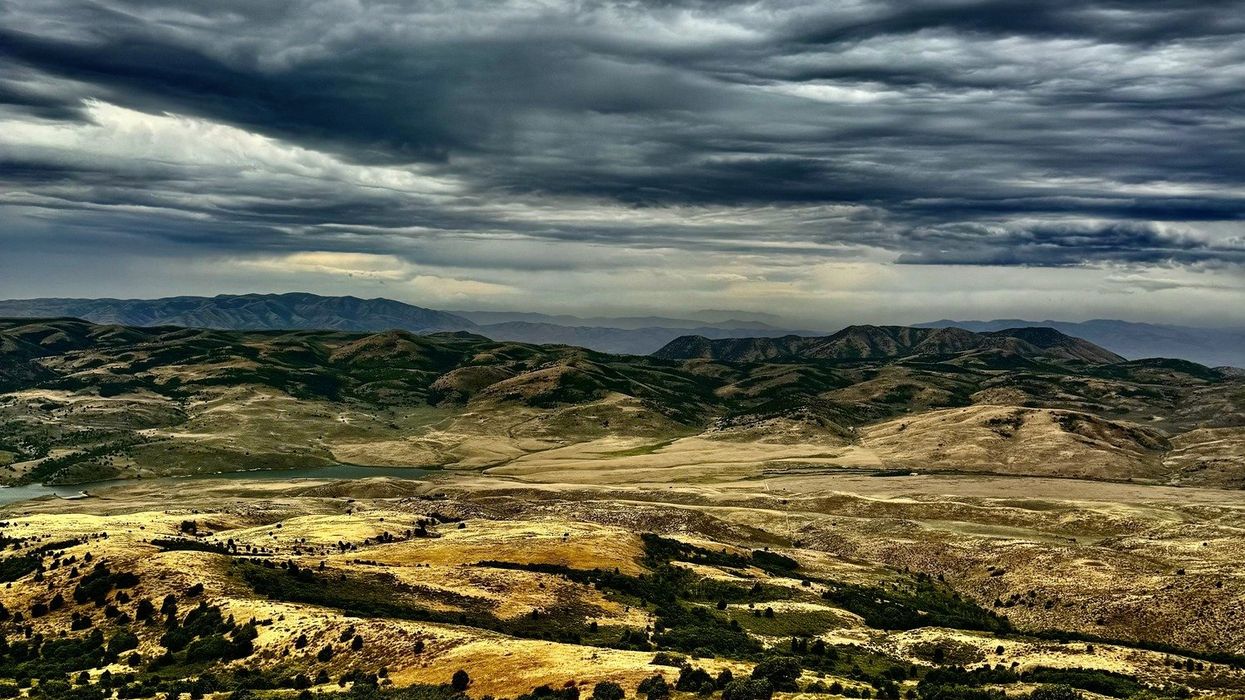"Hold on tight! This part here is a bit rough."
Gripping the bar in the back seat of an open-roofed ATV with Glenn Beck commanding every ounce of horsepower up what felt like a near-vertical ascent in Southern Idaho was not something I had anticipated when I joined his team two years ago.
A few days earlier, my coworkers and I had loaded up into a van and hit the road to Glenn's ranch, a place we had heard so much about. Glenn loves it there, and it's clear why. Civilization's familiarity steadily fades with every passing mile of paved road stretching its arms deeper and deeper into the mountainous canyons where Glenn's ranch is plotted. Once you're on his property, the roads disappear altogether, along with the assumed constraints that we "city folk" abide by without a second thought.
No roads? No problem. A giant bush? We'll drive through it. A vertical ascent? Don't worry, we'll make it. The only thing that could hold us back was the courage of the man at the wheel—and Glenn wasn't holding back. Our ascent could rival some roller coasters at Six Flags.
On the way up, Glenn would intermittently tell stories of the "pioneer spirit"—the uniquely American grit—that paved roads where there were none, made families leave their hometowns for the unknown, and gave men and women the confidence to say, "Let's climb this mountain and see what's on the other side."

Our ATV, in this true "pioneer spirit," continued to "pave its own path" over rocks, brush, and wild rosemary and thyme bushes, sending plumes of dirt and dust to the slightly less fortunate passengers in the two ATVs behind us. We finally reached the top, covered in a thick layer of dirt that was soon forgotten at the thrill of looking over a vast expanse of one small corner of the American West's uncharted and indomitable beauty. Man can climb mountains—on foot, horse-drawn wagon, or, in our case, ATV—but he can never conquer them. America's western landscapes elicit the rare quality of humble courage—the courage to traverse mountains, and the humility to know your place amongst them.
After our winding, meandering trek down the mountain, Glenn gave us a tour of his art studio where he was nearing the completion of his most recent painting, "Morning of the First Resurrection." He has since described it as his "humble attempt to reflect the radiance of Jesus on that glorious resurrection morning," and radiant it was. The light beaming from behind Jesus's head is tangible, and the warmth exuding from Jesus's smile and open arms accosts even the most religiously cynical. It's an image that sticks with you—and it stuck with me.
With Christmas fast approaching "back down the mountain" in Dallas, Texas, I have often thought back on that memory, of the mountains, of Glenn's depiction of Jesus's beckoning countenance. The same radiant man in that painting, who alone has the power and authority to command mountains, made His earthly debut in the most unradiant fashion—likely covered in more dust and grime than the lot of us after our venture in the ATV. Such irony is a stumbling block to those of us who, consciously or not, put our hope in the seemingly salvific power of institutions to command order out of chaos, curb human nature, and provide sustenance. Why give a second thought to a man born amongst animals, shepherds, and peasants on the outskirts of civilization?
In the same way that we travel to the mountains to learn the limits of our nature, revisiting the nativity unveils the scope of His. The man who claims to make nations rise and fall, throw the mountains into the sea, and even forgive sins, didn't choose to live amongst the elites of His time, or live in palaces embodying the force and scope of earthly powers. He chose to dwell amongst people like you and me. He was a refugee, a carpenter, a friend of shepherds, fishermen, and tax collectors, a redeemer of prostitutes and the religious elite alike. Such condescension proves His radiance all the more—not even the stable nor the cross could contain Him. What earthly institutions can minister to the most forgotten and overlooked with such compassion?
This Christmas, as Glenn encouraged his listeners on-air this week, "Turn to God" and find your hope in Him rather than earthly institutions and governments. By coming to terms with our own limits, we can rest in the limitless scope of His radiant love.

 Harold M. Lambert / Contributor | Getty Images
Harold M. Lambert / Contributor | Getty Images
 Adam Gray / Stringer | Getty Images
Adam Gray / Stringer | Getty Images Anadolu / Contributor | Getty Images
Anadolu / Contributor | Getty Images Brandon Bell / Staff | Getty Images
Brandon Bell / Staff | Getty Images